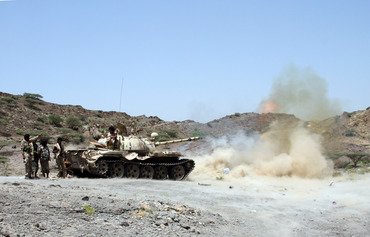Following the breakdown of the months-long peace talks in Kuwait Thursday (July 28th), Yemeni officials and analysts warned that any prolongation of the war benefits only al-Qaeda and the "Islamic State of Iraq and the Levant" (ISIL), providing them an opportunity to grow in strength.
The delegation representing the government of Yemeni President Abd Rabbu Mansour Hadi said it would leave Kuwait on Saturday, signaling the collapse of four months of UN-brokered negotiations with the Houthis and their allies.
"The negotiations have completely ended," said Abdullah al-Olaimi, deputy director of the president's office, AFP reported.
"Prolonging the war and conflict does not serve the Yemeni people" or global peace and security, said Colonel Mohammed Hezam, deputy director general of public relations and moral guidance at the Yemeni Ministry of Interior.
The ongoing war "only serves terrorist groups, such as al-Qaeda and ISIL, who have taken advantage of these circumstances to carry out their terrorist schemes against innocent people, soldiers and officers," he said.
The environment is being exploited by militants "to intensify their attacks on those who oppose them [...] and step up their recruitment of new elements under any name, exploiting the economic conditions citizens are experiencing brought on by the continuing war".
"Not every poor and needy person is joining these groups," Hezam said. "However, poverty could be a contributing factor, when combined with other factors, that [leads the poor and needy] to join these groups."
Drying up sources of extremism
Dr. Yahya al-Sarabi, researcher and university professor at the police academy in Sanaa, also warned of the continuing economic impact of the war.
"The war and conflict have caused almost the majority [of Yemenis] to lose their jobs and forced the closure of many factories and businesses across the country," al-Sarabi told Al-Mashareq. "This is an additional threat to security in that extremist groups are seeking to take advantage of the resulting poverty to boost recruitment and step up their terrorist activities, both through attempting to seize control of some areas, even if temporarily, and increasing suicide attacks [in places like] Aden and al-Mukalla, where many of these attacks take place."
A continuation of the war means that terrorist groups like al-Qaeda and ISIL will be able to expand the scope of their operations on account of numerous divisions prevailing in the country, he said.
A peace agreement would end the divisions and "help put the pieces of state institutions back together so they may work on filling the security and legislative vacuum and confront any subversive plot by any of the terrorist groups that move around freely in the current conflict environment, leaving behind dozens of victims in the wake of their terrorist suicide bombings and assassinations".
He called on the warring parties "to put the national interest ahead of their own interests and the interests of their parties and leaders, for the benefit of the Yemeni people".
Mohammed Azzan, a researcher specializing in Islamist groups, said groups like al-Qaeda and ISIL "take advantage of the war environment, wherein they seek to kill to inflame partisan hatred toward others by exploiting the sectarian and regional dimensions".
These groups work to "expand their terrorist activity against innocent people and all those who they consider to be hostile to their ideas [...] so our problem with them is a problem for society".
Azzan called for an end to the conflict "and the creation of a stable safe environment in order to dry up the sources of terrorism".
"This can only be achieved with a political agreement that puts an end to the war," he said.

![Observers say the failure to reach a peace agreement will expose Yemen to more terrorist attacks, like this car bomb attack at the entrance to the town of Hajr on July 18th. [Abduljabbar Bajubair / AFP]](/cnmi_am/images/2016/07/29/5958-000_db4t1-600_384.jpg)






